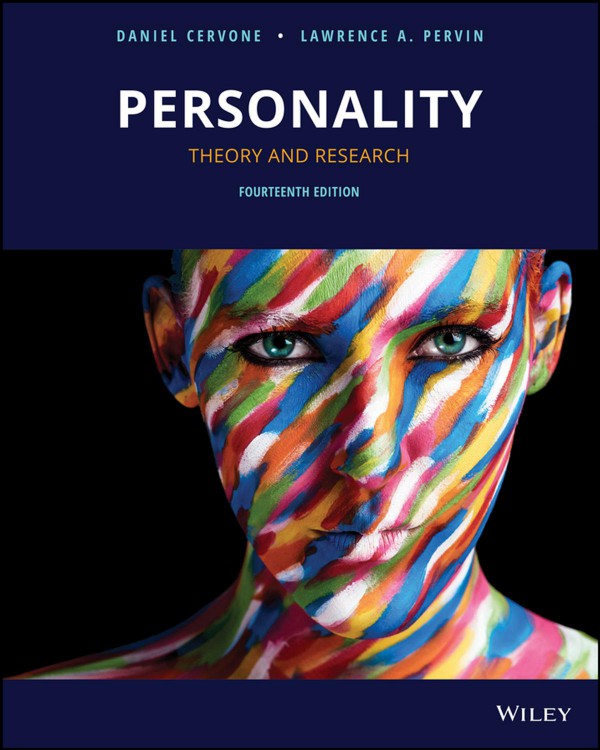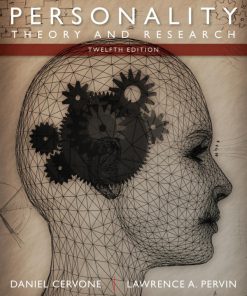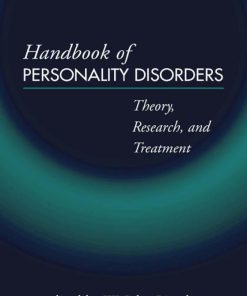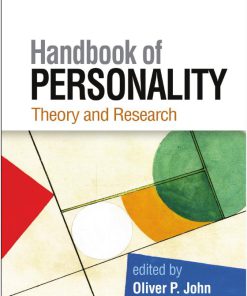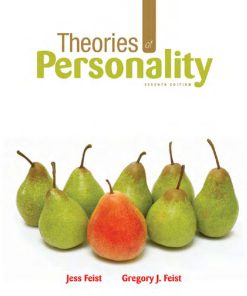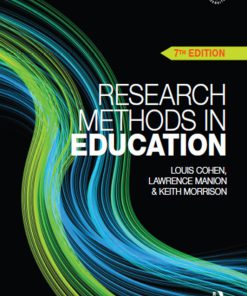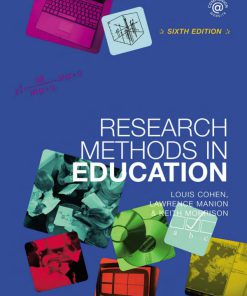Personality Theory and Research 14th Edition by Daniel Cervone, Lawrence Pervin 1119492068 9781119492061
$50.00 Original price was: $50.00.$25.00Current price is: $25.00.
Authors:Daniel Cervone Lawrence A. Pervin , Series:Psychology [115] , Tags:Evolutionary Psychology; Popular Psychology Personality Study; Popular Social Psychology & Interactions , Author sort:Pervin, Daniel Cervone Lawrence A. , Languages:Languages:eng , Published:Published:Aug 2019 , Publisher:Wiley , Comments:Comments:Copyright © 2019, 2016, 2013, 2010, 2007, 2004 John Wiley & Sons, Inc. All rights reserved. No part of this publication may be reproduced, stored in a retrieval system, or transmitted in any form or by any means, electronic, mechanical, photocopying, recording, scanning or otherwise, except as permitted under Sections 107 or 108 of the 1976 United States Copyright Act, without either the prior written permission of the Publisher, or authorization through payment of the appropriate percopy fee to the Copyright Clearance Center, Inc., 222 Rosewood Drive, Danvers, MA 01923 (Web site: www.copyright.com). Requests to the Publisher for permission should be addressed to the Permissions Department, John Wiley & Sons, Inc., 111 River Street, Hoboken, NJ 07030-5774, (201) 748-6011, fax (201) 748-6008, or online at: www.wiley.com/go/permissions
Personality Theory and Research 14th Edition by Daniel Cervone, Lawrence Pervin – Ebook PDF Instant Download/Delivery. 1119492068, 9781119492061
Full download Personality Theory and Research 14th Edition after payment
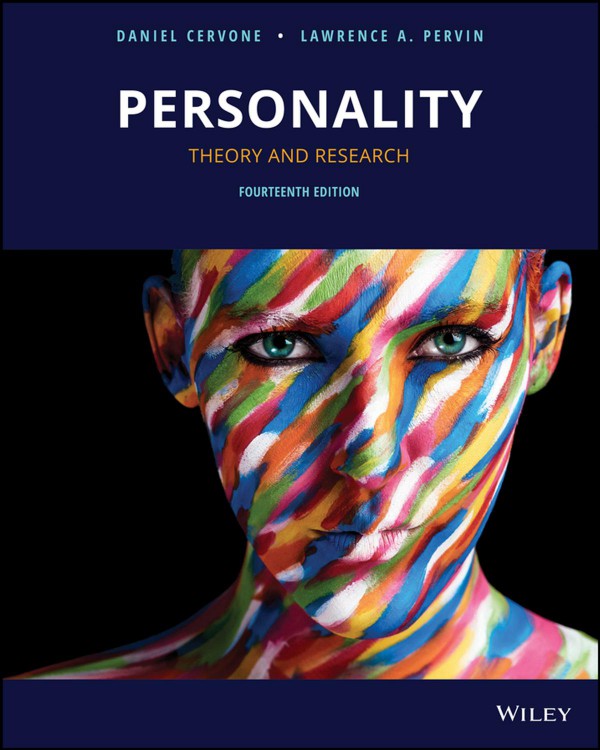
Product details:
ISBN 10: 1119492068
ISBN 13: 9781119492061
Author: Daniel Cervone, Lawrence A. Pervin
An invaluable resource for over four decades, Personality examines the fundamental theories and concepts of personality psychology while exploring contemporary research, new methodologies, and the latest technological advancements. Through a well-rounded blend of theory, case studies, and the latest research, this text identifies the structures and processes of personality, traces personality development, and highlights the value of therapeutic change.
An effective pedagogical structure enhances student interest while strengthening objectivity and critical-thinking skills. Psychodynamic, social-cognitive, and theoretic perspectives are presented in an unbiased–yet critical–fashion that encourages students to compare theories, evaluate evidence, analyze data, and form their own conclusions. Thorough historical coverage is balanced with discussions of the current state of the field, providing a solid understanding of theory and methods as relevant to practice today. Suitable for introductory coursework, this text also serves as a valuable resource for advanced studies and as a reference for professionals in psychology and related fields.
Personality Theory and Research 14th Table of contents:
1 Personality Theory: From Everyday Observations to Systematic Theories
Questions to be Addressed in this Chapter
Defining Personality
Why Study Personality?
Three Goals for the Personality Theorist
Answering Questions about Persons Scientifically: Understanding Structures, Processes, Development, and Therapeutic Change
Important Issues in Personality Theory
Evaluating Personality Theories
The Personality Theories: An Introduction
Major Concepts
Review
2 The Scientific Study of People
Questions to be Addressed in this Chapter
The Data of Personality Psychology
Contemporary Developments in Personality Research: Social Media and Language‐Based Assessments
Goals of Research: Reliability, Validity, Ethical Behavior
Three General Strategies of Research
Personality Theory and Personality Research
Personality Assessment and the Case of Jim
Major Concepts
Review
3 A Psychodynamic Theory: Freud’s Psychoanalytic Theory of Personality
Questions to be Addressed in this Chapter
Sigmund Freud (1856–1939): A View of the Theorist
Freud’s View of the Person
Freud’s View of the Science of Personality
Freud’s Psychoanalytic Theory of Personality
Major Concepts
Review
4 Freud’s Psychoanalytic Theory: Applications, Related Theoretical Conceptions, and Contemporary Research
Questions to be Addressed in this Chapter
Psychodynamic Personality Assessment: Projective Tests
Psychopathology
Psychological Change
The Case of Jim
Related Theoretical Conceptions
Contemporary Developments in Personality Theory: Neuropsychoanalysis
Critical Evaluation
Major Concepts
Review
5 A Phenomenological Theory: The Personality Theory of Rogers
Questions to be Addressed in this Chapter
Carl R. Rogers (1902–1987): A View of the Theorist
Rogers’s View of the Person
Rogers’s View of the Science of Personality
The Personality Theory of Carl Rogers
Major Concepts
Review
6 Rogers’s Phenomenological Theory: Applications, Related Theoretical Conceptions, and Contemporary Research
Questions to be Addressed in this Chapter
Clinical Applications
The Case of Jim
Related Conceptions: Human Potential, Positive Psychology, and Existentialism
Developments in Research: The Self and Authenticity
Contemporary Developments in Personality Theory: Personality Systems Interaction Theory and the Integrated Self
Personality Systems Interaction Theory
Illustrative Research
Implications for Rogers’s Self Theory of Personality
Critical Evaluation
Major Concepts
Review
7 Trait Theories of Personality: Allport, Eysenck, and Cattell
Questions to be Addressed in this Chapter
A View of the Trait Theorists
Trait Theory’s View of the Person
Trait Theory’s View of the Science of Personality
Trait Theories of Personality: Basic Perspectives Shared by Trait Theorists
The Trait Theory of Gordon W. Allport (1897–1967)
Identifying Primary Trait Dimensions: Factor Analysis
The Factor‐Analytic Trait Theory of Raymond B. Cattell (1905–1998)
The Three‐factor Theory of Hans J. Eysenck (1916–1997)
Major Concepts
Review
Chapter 8: Trait Theory: The Five‐Factor Model and Contemporary Developments
Questions to be Addressed in this Chapter
On Taxonomies of Personality
The Five‐Factor Model of Personality: Research Evidence
Five‐Factor Theory
Maybe We Missed One? The Six‐Factor Model
Cross‐cultural Research: Are the Big Five Dimensions Universal?
Contemporary Developments in Trait Theory: Reinforcement Sensitivity Theory
The Case of Jim—Factor‐Analytic Trait‐Based Assessment
The Person‐Situation Controversy
Critical Evaluation
Major Concepts
Review
9 Biological Foundations of Personality
Questions to be Addressed in this Chapter
Temperament
Evolution, Evolutionary Psychology, and Personality
Genes and Personality
Mood, Emotion, and the Brain
Plasticity: Biology as Both Cause and Effect
Neuroscientific Investigations of “Higher‐Level” Psychological Functions
Summary
Major Concepts
Review
10 Behaviorism and The Learning Approaches To Personality
Questions to be Addressed in this Chapter
Behaviorism’s View of the Person
Behaviorism’s View of the Science of Personality
Watson, Pavlov, and Classical Conditioning
Skinner’s Theory of Operant Conditioning
Critical Evaluation
Major Concepts
Review
11 A Cognitive Theory: George A. Kelly’s Personal Construct Theory of Personality
Questions to be Addressed in this Chapter
George A. Kelly (1905–1966): A View of the Theorist
Kelly’s View of the Science of Personality
Kelly’s View of the Person
The Personality Theory of George A. Kelly
Clinical Applications
The Case of Jim
Related Points of View and Recent Developments
Critical Evaluation
Major Concepts
Review
12 Social‐Cognitive Theory: Bandura and Mischel
Questions to be Addressed in this Chapter
Relating Social‐Cognitive Theory to the Previous Theories
A View of the Theorists
Social‐Cognitive Theory’s View of the Person
Social‐Cognitive Theory’s View of the Science of Personality
Social‐Cognitive Theory of Personality: Structure
Social‐Cognitive Theory of Personality: Process
Social‐Cognitive Theory of Growth and Development
Major Concepts
Review
13 Social‐Cognitive Theory: Applications, Related Theoretical Conceptions, and Contemporary Developments
Questions to be Addressed in this Chapter
Cognitive Components of Personality: Beliefs, Goals, and Evaluative Standards
Contemporary Developments in Personality Theory: The KAPA Model
Clinical Applications
Stress, Coping, and Cognitive Therapy
The Case of Jim
Critical Evaluation
Major Concepts
Review
14 Personality In Context: Interpersonal Relations, Culture, and Development Across The Course of Life
Questions to be Addressed in this Chapter
Interpersonal Relationships
Meeting Academic and Social Challenges: Optimistic Strategies and Defensive Pessimism
Personality Development in Socioeconomic Context
Personality Functioning Across the Life Span
Persons in Cultures
Putting Personality in Context into Practice
Summary
Major Concepts
Review
Glossary
References
Author Index
Subject Index
End User License Agreement
People also search for Personality Theory and Research 14th:
chapter 14 theories of personality review worksheet
chapter 14 theories of personality review worksheet answers
personality disorders theory research and treatment
personality theory and research fourteenth edition

